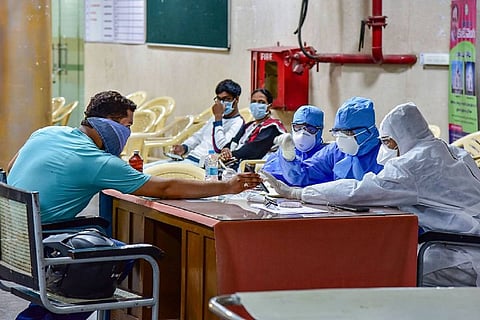

Insurance companies in India have begun offering standard COVID-19 health insurance policies as per guidelines laid down by the Insurance Regulatory Development Authority of India (IRDAI).
There are two policies available -- COVID 'kavach' and COVID 'rakshak' -- both short-term policies, which come with a 15-day waiting period, during which no claim will be accepted.
The COVID 'rakshak' is a benefit-based plan where a policyholder gets a pre-agreed lumpsum amount if they test positive for the coronavirus and are hospitalised for at least 72 hours. Under this policy, the amount is handed out irrespective of the costs incurred for hospitalisation and treatment.
The sum insured under this plan, which will carry tenures of 105 days, 195 days and 285 days and will range from Rs 50,000 to Rs 2.5 lakh. The policy will cease to exist once the claim is paid out.
COVID 'kavach' on the other hand, is an indemnity-based policy, which means that it would cover the actual expense incurred during hospitalisation up to the total sum insured. The base cover will cover hospitalisation expenses such as room and boarding charges.
The policy will also cover home care treatment expenses of up to 14 days, if it is done on a medical practitioner's advice, among other conditions. Cost of pulse oximeters, oxygen cylinders and nebulisers will also be covered.
According to guidelines issued by the IRDAI, the minimum sum insured for the COVID 'kavach' policy will be Rs 50,000 while the maximum would be Rs 5 lakh. There is also a 5% discount for healthcare workers.
According to analysts, COVID 'rakshak' works better as a supplementary product for those who already have regular health insurance, as the patient gets a lump sum upon testing positive for coronavirus and meeting the criteria.
According to reports, it may also help those who are sent to home isolation after a few days of hospitalisation as they are free to spend the money in the manner they choose, for treatment, medicines, nursing charges etc.
Meanwhile, the indemnity policy will help those without any insurance, and also comes with a 'family floater' option -- where all members of a family can avail the insurance limit. This might especially be useful, given that COVID-19 is a contagious disease and family members are usually the primary contacts.
However, some experts point out that a regular health insurance policy is beneficial as it covers hospitalisation, which would anyway include treatment costs for COVID-19, as mandated by the IRDAI.
They say that the maximum sum insured amount under the two policies comes with a cap that may not work in larger cities as the cost of hospitalisation is more. It may also not benefit those who are admitted to the Intensive Care Unit (ICU) or require a ventilator.
The two COVID policies can be availed only by those aged between 18 and 65. Premiums for both the products will be the same throughout India and location-based or zone-wise pricing is not allowed.
IANS inputs